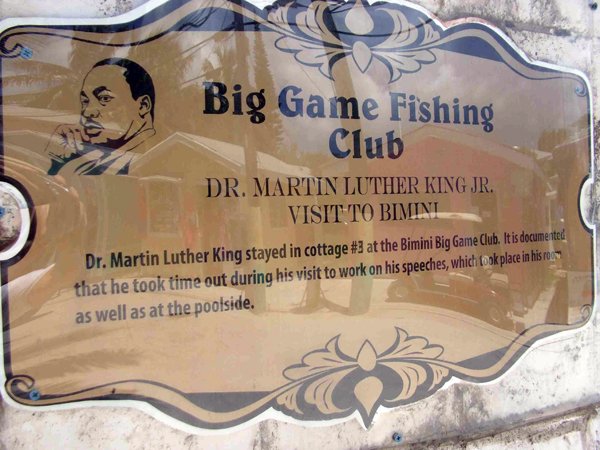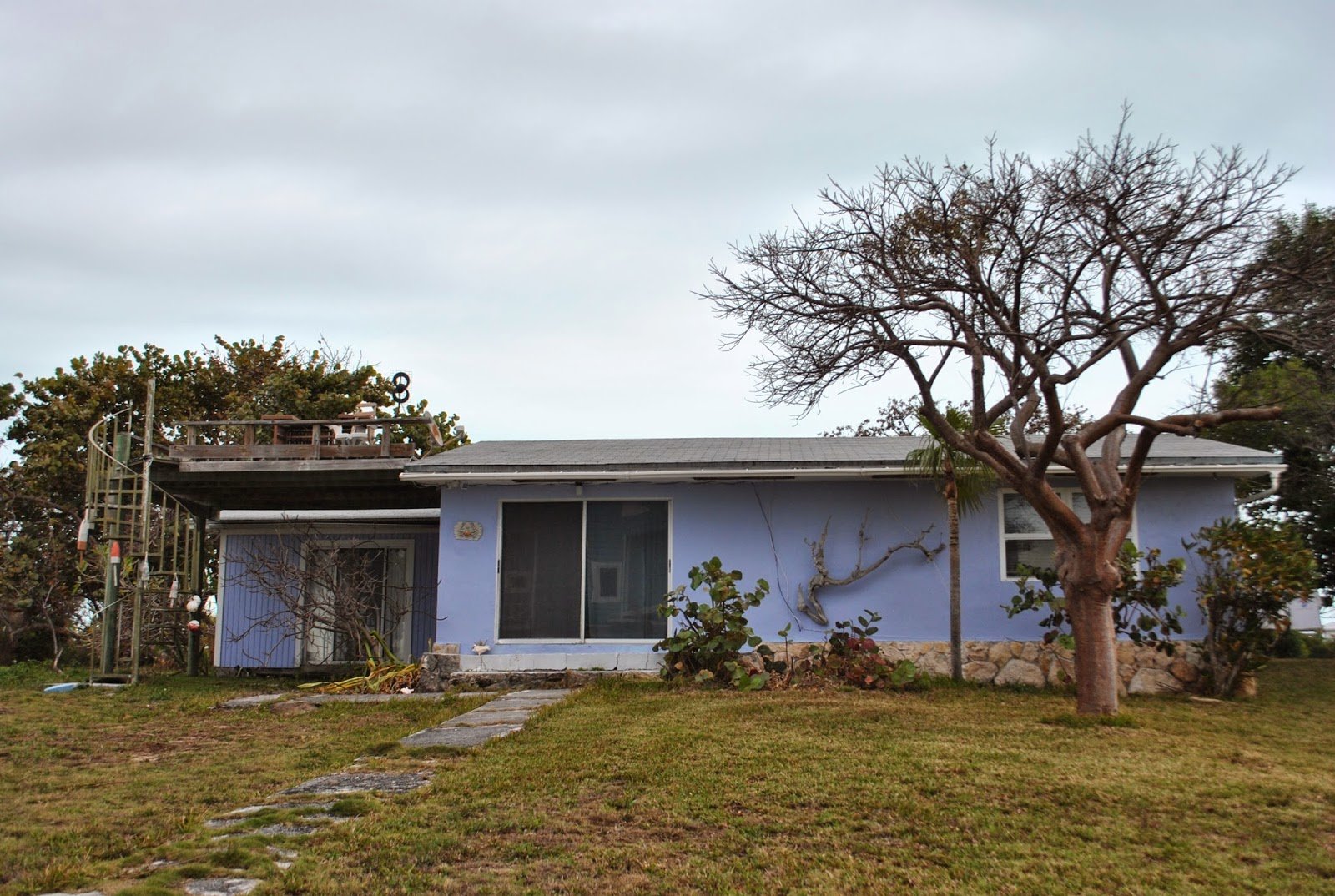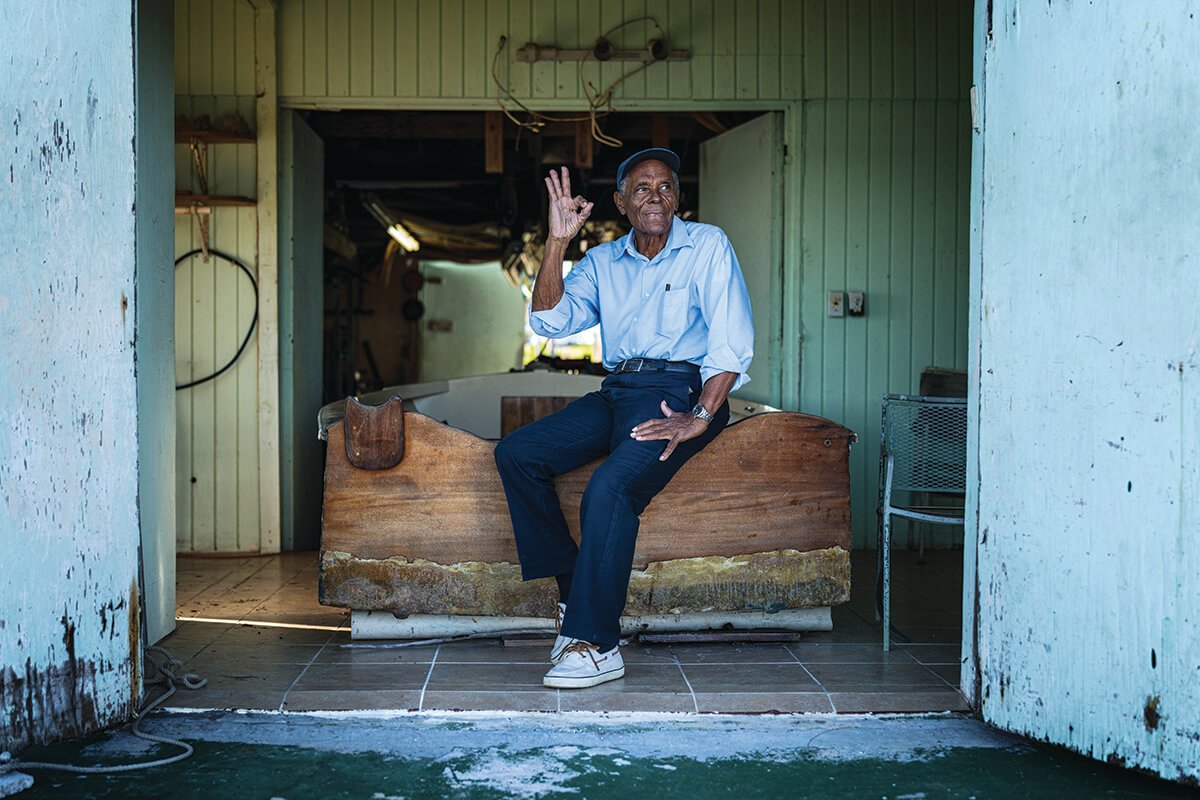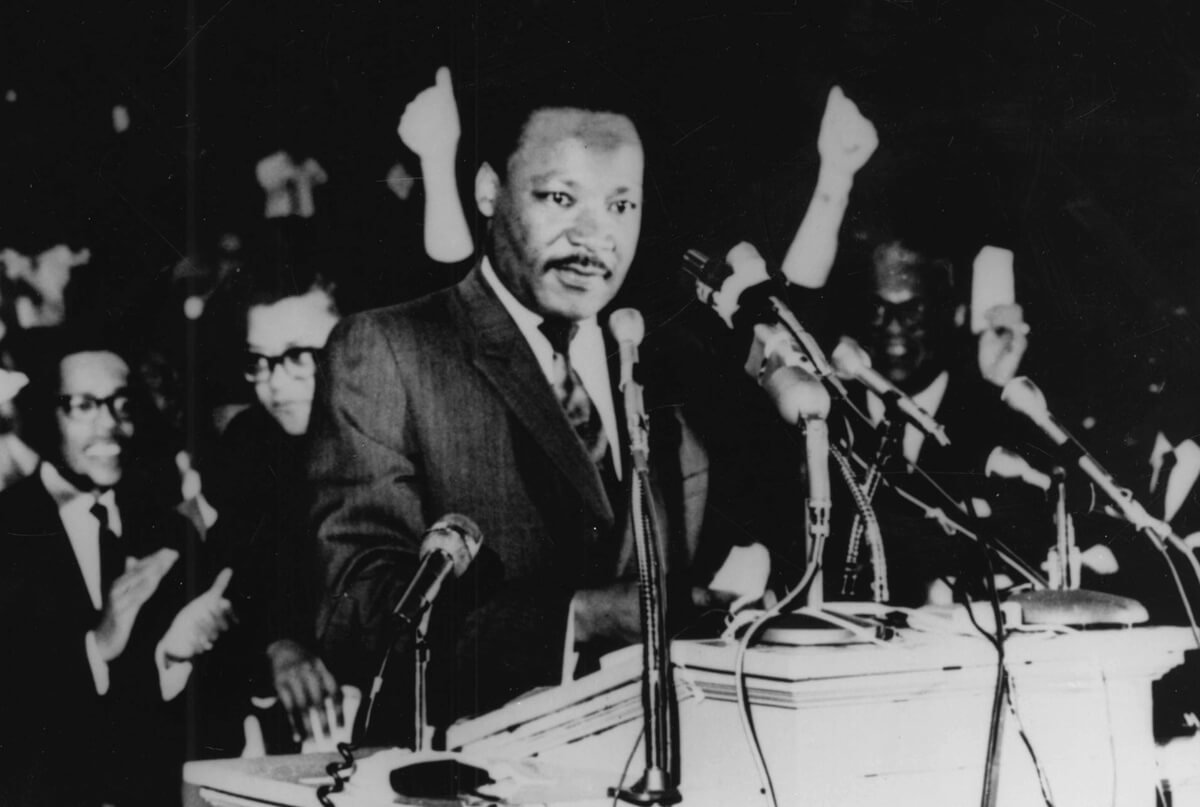He Loved the Tranquility: Reimagining Dr. King's Legacy Through His Bahamas Visits
By Leroy Adams
Photo Credit: Cold Collaborative
In the vastness of Dr. Martin Luther King Jr.'s legacy, his monumental role in the civil rights movement stands paramount, a beacon of hope and relentless courage in the face of deep-seated injustice. We often recall his stirring speeches, his dignified marches, and his unyielding commitment to nonviolence, which forever altered the course of history. Yet, there exists a lesser-known, equally enriching aspect of his life that paints a fuller portrait of this iconic figure. Beyond the podiums and protests, Dr. King found solace and rejuvenation in the embrace of nature. His affinity for the serene landscapes, particularly the tranquil waters of Bimini, Bahamas, reveals a side of him that few have explored. This connection to the natural world not only provided him with moments of much-needed tranquility but also enriched his perspectives and approach to his life's work.
Dr. King Visits Bimini
It's March 31, 1968, a beautiful sunny day in the Bahamas and you’re on a fly fishing boat gliding through the waters of Bimini with Dr. Martin Luther King, Jr. watching him - head slightly tilted back and eyes closed - soak in the natural wonders around him just days before he delivers his poignant final speech - I've Been To The Mountaintop. This was the reality for Captain Ansil Saunders, a local legendary Bimini bonefish guide, fly fisher, and personal friend to Dr. King. In an interview with Fly Fisherman magazine, Captain Ansil summarized his friend's love of the outdoors, "He enjoyed the tranquility and natural wonders of Bonefish Creek." Captain Ansil would take King there on each of his visits.
Bimini, a slice of paradise in the Bahamas, is home to pristine soft, white sands and water so clear you feel you could touch the ocean floor. Bimini is a popular destination for swimming, sunbathing, and snorkeling. It’s also popular for its sport fishing. Divers, anglers, and explorers from all around the world descend on the collection of islands, hoping to catch their next big fish. Although he never fished, Dr. King was known to marvel at Bimini's natural wonders. "King was fascinated with the snappers weaving in and out of the roots of the mangrove trees, the stingrays skimming along the creek bed, and the sounds of birds flying overhead," says Ansil.
Dr. King loved the serenity and natural beauty of Bonefish Creek. Photo credit: Cold Collaborative
Dr. King’s life was a whirlwind of challenges - facing daily threats to his life, leading the civil rights movement, and balancing family life. Like many of us, he sought refuge in a place like Bimini, where sunshine, calming waves, and warm hospitality offered a much-needed escape.
Dr. King's first visit to Bimini was in 1964. He loved it so much he returned in 1968. Sounds like my relationship with Thailand. The first time I set foot in Thailand, I was instantly captivated by the vibrant culture, the warmth of the people, and the breathtaking natural beauty. Each visit to Phuket island left me longing for more, much like Dr. King's affinity for Bimini. As I strolled along the serene beaches of Phuket, I felt a sense of peace that paralleled the tranquility Dr. King must have experienced in the serenity of Bimini.
In 1964, Dr. King sought a tranquil place to write his Nobel Peace Prize acceptance speech. His friend, Rep. Adam Clayton Powell, the first Black American elected to Congress from New York, persuaded him to visit Bimini. At the time, Powell owned a home there. Bimini is a short 50-mile boat ride (or 45-minute flight) off the coast of Florida. Powell introduced Dr. King to Saunders, and Dr. King immediately connected with Saunders and the island community. When he wasn't at the Big Game Club and Resort, where he would stay in room 303 (commonly referred to as King's former room), he was known to walk with locals and sing songs with them. Occasionally, Dr. King would invite Saunders to have a meal with him at the Big Game Fishing Club. Dr. King often ordered cod fritters and ginger ale, a combination Saunders found unusual but Dr. King loved.
Adam Clayton Powell’s House in Bimini still stands today. Photo Credit: Farsighted Fly Girl
Capt. Saunders described Dr. King's 1964 visit as exuberant and joyful. In 1968, he would return, and Capt. Saunders would immediately notice a change in his friend. "He had this look on his face like he knew something was going to happen to him," says Saunders. Capt. Saunders described King's face as "sadness without fear, but the look in his eyes was gentle."
Ansil Saunders: A Legacy of Inspiration
Segregation in Bimini
In addition to becoming a good friend, Dr. King was also an inspiration to Capt. Saunders. In fact, Capt. Saunders started a one-man-sit-in protest at the same Big Game Fishing Club resort where he and Dr. King would enjoy lunch.
Capt. Saunders wasn't permitted to eat at any of the hotels in Bimini or even at the Bimini Big Game Fishing Club, where most of his guests stayed. The Big Game Fishing Club was where all the non-Black anglers and guests congregated and shared meals. Saunders was effectively shut out of a significant part of the fly-fishing community because of the segregated policy against serving Black individuals.
Captain Ansil Saunders. Photo Credit: Cold Collaborative
Capt. Saunder’s Activism
Saunders, inspired by Dr. King and other civil rights activists in the U.S., was undeterred. In his interview, Capt. Saunders describes his protest, "I sat in the Big Game Fishing Club for 41 days during lunchtime from noon until 1 P.M. without being served every day. No other guide wanted to join me."
Television reports of civil rights activists and protesters in the United States motivated Saunders to continue his fight for equality in Bimini. After spending his lunch hour without being served at the Big Game Fishing Club, he would return to work on an empty stomach. He saw his opportunity to finally break the segregation policy at the club when he learned that the owner would soon host political leaders from Nassau.
"I told some of the boys from around [Bimini] that if they joined me in my sit-in protest, I'd buy them all dinner," he shared in his interview. With his community next to him, Saunders told the Big Game Fishing Club management that, though he had been following Dr. Martin Luther King, Jr.'s nonviolent methods, he was also prepared to take a page out of Malcolm X's "By any means necessary" and disrupt service. The owner and government officials were present at the same time. Management swiftly changed their attitude and caved. “They served us like we were the King of England," Saunders recalls. From that day forward, Saunders and other non-white individuals could dine at the Big Game Fishing Club.
Photo Credit: WildQuest
Be True To What You Said On Paper
Have you ever sat and watched the Pacific Ocean? It's voracious. It aggressively approaches the shores, not slow and steady like the tanker in Netflix's Leave The World Behind, but with more intention, as if Aquaman and the city of Atlantis wanted to send a warning sign to the surface people. I sat atop a hulk-size boulder on Qixingtan Beach in Xinchen Township in Taiwan a few years ago. The beach is minutes outside the famous Taroko Gorge National Park and faces the Pacific Ocean.
Enjoying Qixingtan Beach in the Xinchen Township in Taiwan.
Writers, creators, and intellectuals will tell you that their environment can be the difference between creating a Pulitzer Prize-worthy work or whatever 50 Shades of Grey was supposed to be. That day, on Qixingtan Beach, feeling the remnants of the Pacific waves splash against my face, I took refuge on top of that boulder and bore my soul into an article about experiencing grief and death (my brother had recently passed). When I learned that Dr. King, too, would seek tranquil escapes when writing his speeches. I decided to re-read and re-watch the speech he gave - I've Been To The Mountaintop - three days after his second trip to Bimini.
Watching the waves of the Pacific Ocean before I decided to retreat to the boulder.
What was it about Bimini that inspired his writing? After all, this was his second time there. The first time was before he gave his Nobel Peace Prize acceptance speech.
What did he see, smell, taste, or experience that may have influenced his last speech?
The Universal Struggle for Freedom
During one of his visits to Nassau, Bahamas, Dr. Martin Luther King Jr. meets with the late Sir Randol Fawkes, a lawyer and politician who was often referred to as “The Father of Labor” for the work that he did in establishing the trade union movement in The Bahamas. Photo Credit: Bahamas Chronicle
Many historians, scholars, and speech aficionados have described Dr. King's last speech as his most profound, if not downright prophetic. Delivered on April 3, 1968,[4] at the Mason Temple (Church of God in Christ Headquarters) in Memphis, Tennessee, the speech primarily concerns the Memphis sanitation strike. The speech lasted for one hour, and throughout, Dr. King called for unity, economic actions, boycotts, and nonviolent protest while challenging the United States to live up to its ideals. At the end of the speech, he discusses the possibility of an untimely death. He was assassinated the next day.
Facing the Mason Temple congregation, Dr. King takes the audience on a global journey, weaving his way through the history of the struggle for human rights and freedom.
Dr. King delivers his final speech - I’ve Been To The Mountaintop - at the Mason Temple (Church of God in Christ Headquarters) in Memphis, Tennessee.
I would take my mental flight by Egypt through, or rather across the Red Sea, through the wilderness on toward the promised land…I wouldn't stop there. I would move on by Greece, and take my mind to Mount Olympus. And I would see Plato, Aristotle, Socrates, Euripides and Aristophanes assembled around the Parthenon as they discussed the great and eternal issues of reality…But I wouldn't stop there. I would go on, even to the great heyday of the Roman Empire. And I would see developments around there, through various emperors and leaders. But I wouldn't stop there…I would come on up even to 1863, and watch a vacillating president by the name of Abraham Lincoln finally come to the conclusion that he had to sign the Emancipation Proclamation. But I wouldn't stop there. I would even come up to the early thirties and see a man grappling with the problems of the bankruptcy of his nation…But I wouldn't stop there…Strangely enough, I would turn to the Almighty and say, "If you allow me to live just a few years in the second half of the twentieth century, I will be happy…The masses of people are rising up. And wherever they are assembled today, whether they are in Johannesburg, South Africa; Nairobi, Kenya; Accra, Ghana; New York City; Atlanta, Georgia; Jackson, Mississippi; or Memphis, Tennessee — the cry is always the same — "We want to be free."
He references various countries and historical periods to emphasize the universal struggle for freedom and the interconnectedness of human endeavors. He navigates through time and space, mentioning places like Egypt, Greece, Rome, and the Renaissance era to highlight the perpetual quest for truth and justice. Dr. King reminds us of our recent history with - at the time - contemporary references to countries like South Africa, Kenya, and Ghana, drawing parallels between their struggles for freedom and the plight of Black people in the United States. These global references unify the struggles across different eras and geographies, emphasizing a collective human journey toward equality and freedom – a journey that continues today in places like Palestine, where the call for liberation echoes the very principles Dr. King championed. Free Palestine.
Supporting Black Businesses
Everything Black is what Dr. King said later in his speech when discussing the economic power of Black America at the time and the necessity of this power for Black liberation.
Photo Credit: Chicago Public Library
Now, the other thing we'll have to do is this: Always anchor our external direct action with the power of economic withdrawal. Now, we are poor people, individually... Never stop and forget that collectively…we are richer than all the nations in the world. We have an annual income of more than thirty billion dollars a year, which is more than all of the exports of the United States, and more than the national budget of Canada… That's power right there, if we know how to pool it…we just need to go around to these stores, and to these massive industries in our country, and say, "God sent us by here, to say to you that you're not treating his children right…Now, if you are not prepared to do that, we do have an agenda that we must follow. And our agenda calls for withdrawing economic support from you."
Dr. King was canceling folks before my generation understood the power behind the term. He continues…
And so…we are asking you tonight to go out and tell your neighbors not to buy Coca-Cola in Memphis..tell them not to buy Sealtest milk. Tell them not to buy Wonder Bread…But not only that, we've got to strengthen black institutions…take your money out of the banks downtown and deposit your money in Tri-State Bank—we want a "bank-in" movement in Memphis… I'm not asking you something we don't do ourselves at SCLC. Judge Hooks and others will tell you that we have an account here in the savings and loan association from the Southern Christian Leadership Conference. We're just telling you to follow what we're doing. Put your money there. You have six or seven black insurance companies in Memphis. Take out your insurance there. We want to have an "insurance-in."
Now, these are some practical things we can do. We begin the process of building a greater economic base.
Instagram post encouraging viewers to support Black businesses.
In reflecting on Dr. King's powerful call for economic empowerment within the Black community, it's impossible not to draw parallels with today's movements. Just as Dr. King emphasized the importance of supporting Black businesses and using economic strength as a tool for social change, we see a similar resurgence in this ethos today. Movements like #BuyBlack and #SupportBlackBusinesses echo Dr. King's vision, encouraging us to channel our spending power into Black-owned enterprises. This isn't just a trend; it's a powerful statement of community and solidarity, mirroring the economic activism Dr. King championed.
Modern initiatives like 'The 15 Percent Pledge,' which urges major retailers to commit a portion of their shelf space to Black-owned businesses, are a direct continuation of Dr. King's legacy. Social media campaigns and apps designed to locate Black-owned businesses bring this idea into the digital age, making it easier for consumers to make socially conscious choices. By participating in these movements, we're not just buying products or services; we're actively participating in a legacy of economic empowerment that Dr. King laid the groundwork for decades ago. In this way, each purchase becomes a small but significant act to building a greater economic base.
A Call to the Constitution
It's impossible to find a speech by Dr. King that doesn’t highlight the stark contrast between the ideals enshrined in the U.S. Constitution and the reality of racial injustice. He famously urged the United States to “be true to what you said on paper” - a powerful demand for moral accountability. In a country professing freedom and equality, King pointed out the hypocrisy of denying these rights to Black citizens. He had an envious gift of wordplay, mixing in a bit of shade when illustrating how racism and anti-Blackness watered down the ideals embedded within the 4,543-word document.
All we say to America is, "Be true to what you said on paper." If I lived in China or even Russia, or any totalitarian country, maybe I could understand the denial of certain basic First Amendment privileges, because they hadn't committed themselves to that over there. But somewhere, I read of the freedom of assembly. Somewhere I read of the freedom of speech. Somewhere, I read of the freedom of the press. Somewhere I read that the greatness of America is the right to protest for right.
"Be true to what you said on paper" is a phrase that is now and will forever remain in my arsenal when my soon-to-be wife behaves in a way counter to her wedding vows. It's a stinger.
Reimagining Dr. King's Legacy Today
Imagine taking your next vacation to Bimini. You’re in a boat gliding through Bonefish Creek just as Dr. King did and you’re marveling at the mangrove trees and stingrays swimming beneath the boat. You look up and off in the distance you notice something unusual, but also, it looks perfectly placed. Your boat gets closer and you see a hand-carved bust of Dr. King.
In the serenity of the mangroves of Bonefish Creek in Bimini, there's a quietly powerful tribute to Dr. King, crafted by his friend, Captain Ansil Saunders. It's a hand-carved bust of Dr. King, thoughtfully placed in the very environment that brought him peace. This bust, still standing today, serves as a poignant symbol of the bond between Dr. King and the tranquil place. Imagine, next year on January 15, standing in front of this heartfelt dedication honoring Dr. King in a new and special way.
Capt. Saunders hand-carved a bust of Dr. King to honor his late friend. The bust still stands today in Bonefish Creek in Bimini.
In the 3rd grade, I recited Dr. King’s “I Have A Dream Speech” in front of a full basketball gym. Looking back, I was probably their student version of Gregory from Abbott Elementary during the ‘Educator of the Year” episode. It was Martin Luther King Jr. Day, and my school needed to save face in front of the school district. I dressed in my Sunday best with my tiny clip-on black tie. I practiced the speech for weeks. The kind of dedication to your craft I believed Dr. King to have. I read his speech repeatedly in front of a mirror, pretending to project his powerful, eloquent, emotive speaking style, pretending to be him and having his confidence. I made my parents proud on the day, reciting the speech without looking down.
Organized by Black Outside, Inc., Brothers With The Land, and the cast of the Blackwater documentary a group of men and boys took a fly fishing trip on the birthday of Dr. Martin Luther King Jr. to honor him and his love for the outdoors.
This past weekend, I joined a group of Black men who took a fly fishing trip to Camp Capers to honor Dr. King and connect with history differently. The trip organizers included Black Outside, Inc., a non-profit organization dedicated to reconnecting Black, African-American youth to the outdoors; Brothers With The Land, a program under the Black Outside brand that creates immersive, nature-based mentorship spaces for Black male high school students within central Texas. Each outdoor experience provides space for Black boys to reflect on their identities and connect with the natural world around them, and the cast from the Blackwater Documentary, a film about five Black men who go on an expedition in the Gates Of The Arctic National Park. These organizers designed the trip to allow men to build brotherhood and honor the memory of Dr. King by learning about his connection to nature and how travel influenced his advocacy and leadership.
Furthermore, it was important for the men and the boys who joined us on the trip to learn about Dr. King’s friendships and connections to people in other countries. So much of the Black American experiences portrayed in popular culture and literature are restricted to the United States. We’re seldom exposed to stories that reveal us as globetrotters, citizen diplomats, explorers, or wanderers of the unknown world.
Nick Brooks, on of the members of the Blackwater crew, teaches a young boy how to cast a fly fishing line.
Dudley Edmondson teaches a group of men how to cast a fly fishing line.
Many of the men shared that they felt connected to Dr. King and his story in a way that had been lost through co-opting his legacy. Being outdoors in nature allowed us to sit in peace and calm, connecting with the water around us, imagining what Dr. King may have felt or been thinking while he was on that boat in Bimini, knowing that death was possibly knocking on his door. Did he know that challenging the capitalist machine at the foundation of America by encouraging Black people to “withdraw economic” support from white businesses to Black businesses would cost him his life? We’ll never know, but we do know that he was not afraid to stand on business even if it cost him his life.
How Will You Honor Your Heroes?
Dr. King returned to Bimini in March of 1968. This time, though, was different from the joyful visit in 1964. "He had this look on his face like he knew something was going to happen to him," says Saunders. Behind Dr. King's smile, Saunders saw sadness without fear, but the look in his eyes was gentle. "King had love flowing out of his eyes," Saunders recalls.
Saunders took him back to Bonefish Creek, where Dr. King worked on his speech - I've Been To The Mountaintop - which he planned to give to Memphis sanitation strike participants in early April. "It was like he was in a dream or looking far into the future," says Saunders on Dr. King's demeanor during this final visit to Bimini. "That's how he looked to me that day: like he couldn't figure something out or that there was something unfinished."
Reimagining how we celebrate and honor historical figures by blending their public achievements with their personal interests allows us to understand their whole persona and strengthens our connection. As a 35-year-old who loves travel and the outdoors, learning that Dr. King shared these passions and how they influenced his work has given me a new perspective on celebrating this great man. It has deepened my understanding of his impact on the world. This realization has re-energized my commitment to writing and sharing stories that bridge travel and culture.
Captain Saunders was devastated when he learned that Dr. King was assassinated the very next day. "I put the television on and watched when Walter Cronkite took off his glasses and announced Dr. King's death. I couldn't eat. I put my flag at half-mast. Some people laughed at me for doing it, but he was my friend. He died too early."
I miss my friend," Saunders says. "He helped me find my voice."
My connection to Dr. King now goes beyond common misinterpretations to embrace the whole man: the activist, orator, and traveler. In the latest issue of Culture Travels, we argue that travel culture is a vital part of Black culture and deserves recognition. Our histories and today's Black Travel Movement represent our people's journeys across continents and borders, both geographically and culturally. By integrating this aspect of our culture into the larger narrative, we enrich our collective identity, recognizing that our travels do more than change locations—they transform societies. Connecting with and celebrating the legacies of our heroes through their personal interests - like travel - can redefine our relationships with history's greatest leaders, perhaps helping us find our voices, just as Dr. King did for Captain Saunders.
See you in Bimini.
Photo Credit: Bahamas Chronicle

















